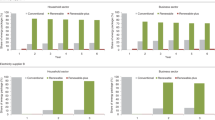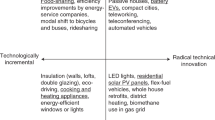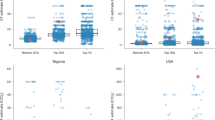Abstract
Here we discuss how personal carbon allowances (PCAs) could play a role in achieving ambitious climate mitigation targets. We argue that recent advances in AI for sustainable development, together with the need for a low-carbon recovery from the COVID-19 crisis, open a new window of opportunity for PCAs. Furthermore, we present design principles based on the Sustainable Development Goals for the future adoption of PCAs. We conclude that PCAs could be trialled in selected climate-conscious technologically advanced countries, mindful of potential issues around integration into the current policy mix, privacy concerns and distributional impacts.
This is a preview of subscription content, access via your institution
Access options
Access Nature and 54 other Nature Portfolio journals
Get Nature+, our best-value online-access subscription
$29.99 / 30 days
cancel any time
Subscribe to this journal
Receive 12 digital issues and online access to articles
$119.00 per year
only $9.92 per issue
Buy this article
- Purchase on SpringerLink
- Instant access to full article PDF
Prices may be subject to local taxes which are calculated during checkout

Similar content being viewed by others
References
Fuso Nerini, F. et al. Connecting climate action with other Sustainable Development Goals. Nat. Sustain. 2, 674–680 (2019).
Warming Projections Gobal Update (Climate Action Tracker, 2021); https://climateactiontracker.org/publications/global-update-climate-summit-momentum/
IEA World Energy Outlook 2020 (OECD, 2020); https://doi.org/10.1787/557a761b-en
Reducing UK Emissions: 2020 Progress Report to Parliament (UK Climate Change Committee, 2020); https://www.theccc.org.uk/publication/reducing-uk-emissions-2020-progress-report-to-parliament/
Fawcett, T. Personal carbon trading: a policy ahead of its time? Energy Policy 38, 6868–6876 (2010).
Fawcett, T. & Parag, Y. An introduction to personal carbon trading. Clim. Policy 10, 329–338 (2010).
Suryapratim, R. Situating the Individual Within a Behavioural Law and Economics Approach to End-User. Doctoral thesis, Univ. Groningen (2017).
Parag, Y. & Fawcett, T. Personal carbon trading: a review of research evidence and real-world experience of a radical idea. Energy Emiss. Control Technol. 2, 23–32 (2014).
Synthesis Report on the Findings from Defra’s Pre-Feasibility Study into Personal Carbon Trading (DEFRA, 2008).
Fleming, D. Energy and the Common Purpose: Descending the Energy Staircase with Tradable Energy Quotas (TEQs) (The Lean Economy Connection, 2007).
Cap and Share—A Fair Way to Cut Greenhouse Emissions (FEASTA, 2008); https://www.feasta.org/2008/05/29/cap-and-share-a-fair-way-to-cut-greenhouse-emissions/
Niemeier, D. et al. Rethinking downstream regulation: California’s opportunity to engage households in reducing greenhouse gases. Energy Policy 36, 3436–3447 (2008).
Raux, C. & Marlot, G. A system of tradable CO2 permits applied to fuel consumption by motorists. Transp. Policy 12, 255–265 (2005).
Woerdman, E. & Bolderdijk, J. W. Emissions trading for households? A behavioral law and economics perspective. Eur. J. Law Econ. 44, 553–578 (2017).
Ayres, R. U. Environmental market failures: are there any local market-based corrective mechanisms for global problems? Mitig. Adapt. Strateg. Glob. Change 1, 289–309 (1997).
Chatterton, T. An Introduction to Thinking about ‘Energy Behaviour’: A Multi Model Approach (Department of Energy and Climate Change, 2011); https://www.gov.uk/government/publications/thinking-about-energy-behaviour-a-multi-model-approach
Darby, S. Literature Review for the Energy Demand Research Project (Environmental Change Institute, Univ. Oxford, 2010).
Zanni, A. M., Bristow, A. L. & Wardman, M. The potential behavioural effect of personal carbon trading: results from an experimental survey. J. Environ. Econ. Policy 2, 222–243 (2013).
Bator, R. J., Tabanico, J. J., Walton, M. L. & Schultz, P. W. Promoting energy conservation with implied norms and explicit messages. Soc. Influ. 9, 69–82 (2014).
Schultz, P. W., Nolan, J. M., Cialdini, R. B., Goldstein, N. J. & Griskevicius, V. The constructive, destructive, and reconstructive power of social norms: research article. Psychol. Sci. 18, 429–434 (2007).
Kormos, C., Gifford, R. & Brown, E. The influence of descriptive social norm information on sustainable transportation behavior: a field experiment. Environ. Behav. 47, 479–501 (2015).
Parag, Y., Capstick, S. & Poortinga, W. Policy attribute framing: a comparison between three policy instruments for personal emissions reduction. J. Policy Anal. Manage. 30, 889–905 (2011).
Parag, Y. & Eyre, N. Barriers to personal carbon trading in the policy arena. Clim. Policy 10, 353–368 (2010).
Corner, A. Personal carbon allowances–a ‘big idea that never took off’. The Guardian https://www.theguardian.com/sustainable-business/personal-carbon-allowances-budgets (30 April 2012).
Fuso Nerini, F., Swain, A. & Swain, R. B. Sustainable development in the wake of COVID-19. Preprint at ResearchSquare https://doi.org/10.21203/rs.3.rs-63414/v1 (2020).
Shan, Y. et al. Impacts of COVID-19 and fiscal stimuli on global emissions and the Paris Agreement. Nat. Clim. Change 11, 200–206 (2020).
Vinuesa, R. et al. The role of artificial intelligence in achieving the Sustainable Development Goals. Nat.Commun. 11, 233 (2020).
Personal Carbon Trading—Fifth Report of Session 2007–08 (UK House of Commons Environmental Audit Committee, 2008); https://publications.parliament.uk/pa/cm200708/cmselect/cmenvaud/565/565.pdf
Gough, I. Heat, Greed and Human Need: Climate Change, Capitalism and Sustainable Wellbeing (Elgar, 2017).
Lockwood, M. The economics of personal carbon trading. Clim. Policy 10, 447–461 (2010).
Drummond, P. & Ekins, P. Reducing CO2 emissions from residential energy use. Build. Res. Inf. 44, 585–603 (2016).
Rosenow, J., Fawcett, T., Eyre, N. & Oikonomou, V. Energy efficiency and the policy mix. Build. Res. Inf. 44, 562–574 (2016).
Whitmarsh, L., Seyfang, G. & O’Neill, S. Public engagement with carbon and climate change: to what extent is the public ‘carbon capable’? Glob. Environ. Change 21, 56–65 (2011).
Andersson, D., Lofgren, A. & Widergerg, A. Attitudes to Personal Carbon Allowances (School of Business, Economics and Law, Univ. Gothenburg, 2011); https://gupea.ub.gu.se/handle/2077/25549
Starkey, R. Personal carbon trading: a critical survey. Part 1: equity. Ecol. Econ. 73, 7–18 (2012).
IPCC Special Report on Global Warming of 1.5 °C (eds Masson-Delmotte, V. et al.) (WMO, 2018); http://www.ipcc.ch/report/sr15/
Martiskainen, M. et al. Contextualizing climate justice activism: knowledge, emotions, motivations, and actions among climate strikers in six cities. Glob. Environ. Change 65, 102180 (2020).
Parth, A.-M., Weiss, J., Firat, R. & Eberhardt, M. “How dare you!”—the influence of Fridays for Future on the political attitudes of young adults. Front. Polit. Sci. 2, 611139 (2020).
Marquardt, J. Fridays for Future’s disruptive potential: an inconvenient youth between moderate and radical Ideas. Front. Commun. 5, 48 (2020).
Woerdman, E., Couwenberg, O. & Nentjes, A. Energy prices and emissions trading: windfall profits from grandfathering? Eur. J. Law Econ. 28, 185–202 (2009).
Willis, R. Too Hot to Handle? The Democratic Challenge of Climate Change (Bristol Univ. Press, 2020).
Emissions Gap Report 2020 (UNEP, 2020); https://www.unep.org/emissions-gap-report-2020
Akinbi, A., Forshaw, M. & Blinkhorn, V. Contact tracing apps for the COVID-19 pandemic: a systematic literature review of challenges and future directions for neo-liberal societies. Heal. Inf. Sci. Syst. 9, 18 (2021).
Shahroz, M. et al. COVID-19 digital contact tracing applications and techniques: a review post initial deployments. Transp. Eng. 5, 100072 (2021).
Kapa, S., Halamka, J. & Raskar, R. Contact tracing to manage COVID- 19 spread—balancing personal privacy and public health. Mayo Clin. Proc. 95, 1320–1322 (2020).
Sharma, T. & Bashir, M. Use of apps in the COVID-19 response and the loss of privacy protection. Nat. Med. 26, 1165–1167 (2020).
Darby, S. J. The role of smart meters in carbon management. Carbon Manage. 4, 111–113 (2013).
Sullivan, R. K. et al. Smartphone apps for measuring human health and climate change co-benefits: a comparison and quality rating of available apps. JMIR mHealth uHealth 4, e135 (2016).
Nunes, I. & Jannach, D. A systematic review and taxonomy of explanations in decision support and recommender systems. User Model. User Adapt. Interact. 27, 393–444 (2017).
Zawacki-Richter, O., Marín, V. I., Bond, M. & Gouverneur, F. Systematic review of research on artificial intelligence applications in higher education–where are the educators? Int. J. Educ. Technol. High. Educ. 16, 39 (2019).
Park Woolf, B. Building Intelligent Interactive Tutors: Student-Centered Strategies for Revolutionizing E-Learning (Elsevier, 2009).
Fuso Nerini, F. et al. Mapping synergies and trade-offs between energy and the Sustainable Development Goals. Nat. Energy 3, 10–15 (2018).
Fawcett, T. Personal carbon trading in different national contexts. Clim. Policy 10, 339–352 (2010).
Woerdman, E. Path-dependent climate policy: the history and future of emissions trading in Europe. Eur. Environ. 14, 261–275 (2004).
OECD in Science, Technology and Industry Outlook 2010 251–279 (OECD, 2010).
Gunningham, N. & Sinclair, D. Regulatory pluralism: designing policy mixes for environmental protection. Law Policy 21, 49–76 (1999).
Kern, F., Kivimaa, P. & Martiskainen, M. Policy packaging or policy patching? The development of complex energy efficiency policy mixes. Energy Res. Soc. Sci. 23, 11–25 (2017).
Howlett, M. & Rayner, J. in Handbook of Policy Formulation (eds Howlett, M. et al) 112–128 (Edward Elgar, 2017).
Dobbins, A., Fuso Nerini, F., Deane, P. & Pye, S. Strengthening the EU response to energy poverty. Nat. Energy 4, 2–5 (2019).
Véliz, C. Privacy and digital ethics after the pandemic. Nat. Electronics 4, 10–11 (2021).
Thumim, J. & White, V. Distributional Impacts of Personal Carbon Trading: A Report to the Department for Environment, Food and Rural Affairs (DEFRA, 2008); https://www.gov.uk/government/organisations/department-for-environment-food-rural-affairs/about/research (2008).
Li, J., Fan, J., Zhao, D. & Wang, S. Allowance price and distributional effects under a personal carbon trading scheme. J. Clean. Prod. 103, 319–329 (2015).
Uusitalo, E., Kuokkanen, A., Uusitalo, V., von Wright, T. & Huttunen, A. Personal carbon trading in mobility may have positive distributional effects. Case Stud. Transp. Policy 9, 315–323 (2021).
Parag, Y. & Strickland, D. Personal carbon trading: a radical policy option for reducing emissions from the domestic sector. Environment 53, 29–37 (2011).
Acknowledgements
F.F.N. acknowledges the KTH Climate Action Centre for providing a platform for this research. T.F. acknowledges funding from UK Research and Innovation via the Centre for Research into Energy Demand Solutions (grant agreement number EP/R035288/1).
Author information
Authors and Affiliations
Contributions
F.F.N. led the manuscript conception, design, writing and revisions. T.F., Y.P. and P.E. all contributed to the design of the work, content development, writing and revisions.
Corresponding author
Ethics declarations
Competing interests
The authors declare no competing interests.
Additional information
Peer review information: Nature Sustainability thanks Jing Wan and Edwin Woerdman for their contribution to the peer review of this work.
Publisher’s note Springer Nature remains neutral with regard to jurisdictional claims in published maps and institutional affiliations.
Rights and permissions
About this article
Cite this article
Fuso Nerini, F., Fawcett, T., Parag, Y. et al. Personal carbon allowances revisited. Nat Sustain 4, 1025–1031 (2021). https://doi.org/10.1038/s41893-021-00756-w
Received:
Accepted:
Published:
Issue Date:
DOI: https://doi.org/10.1038/s41893-021-00756-w
This article is cited by
-
Understanding the large role of long-distance travel in carbon emissions from passenger travel
Nature Energy (2024)
-
Decoding environmental impact with image-based CO2 emission analytics
Carbon Neutrality (2024)
-
Dynamic decision-making for carbon emission reduction in the electricity supply chain under different allowance allocation schemes
Annals of Operations Research (2024)
-
Personal emission permit trading scheme: urban spatial equilibrium and planning
Natural Hazards (2023)
-
How does personalized feedback on carbon emissions impact intended climate action?
Environment, Development and Sustainability (2023)



